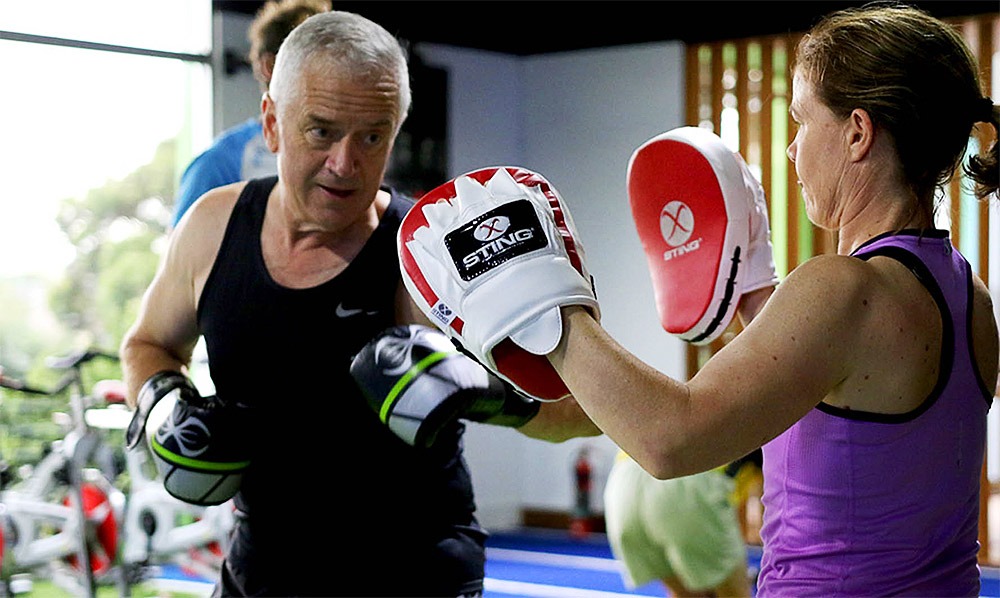High intensity interval training (HIIT) is a great way of improving your fitness. But is high intensity interval training safe for seniors? This is an incredibly important question as the population ages and is still very active.
But first let’s compare high intensity workouts with steady state training, such as just going for a run at a long steady pace. HIIT training utilises multiple energy system that are used in most every-day life activities and sports. What does this mean?
Steady State Training.
Long, steady running works primarily on the aerobic energy system, which involves the full break down of oxygen in the muscle cells, which provides the cells with the full energy supplies from glucose and fats. However, your body is only able to use aerobic energy system during activity where the exercises are at a slow steady pace and below your aerobic threshold, i.e. before you start puffing and need to stop talking while exercising or walking.
High Intensity Interval Training.
High intensity interval training involves not only using the aerobic system, but the anaerobic system with the production of lactic acid in the muscles. This allows you to use your fast energy supply systems, which do not fully break down glucose and fats in the short term while lactic acid builds up in the muscles and blood.
HIIT also uses your very fast energy system, which works for a few seconds and allows you to sprint very fast, for a very short period. Most sports are interval based sports, unless you are doing marathon or other long-distance events. For example, when playing football, you stop/start, sprint, run for a moderate period of time, stop, sprint, etc. This is an interval based sport and you need interval based training to improve, so HIIT training is perfect.
Seniors & High Intensity Interval Training.
Is high intensity interval training safe for seniors? The answer is yes, but it depends on doctor’s advice after the doctor conducts a stress test and other tests are performed to determine your level of cardiac artery health indicating the level of plaque build-up in your arteries. When you get older, it may not just be fitness which stops you training using HIIT, but other medical issues, such as cardiovascular disease, blood pressure, respiratory health, joint pain or muscle weakness.
It is most important to consult your doctor before commencing any new exercise activity. Once they have given you the all clear as described above, then further testing by a physiotherapist or exercise physiologist familiar with cardio fitness testing protocols, such as the YMCA sub-maximal fitness testing, can determine at which intervals you can exercise safely. A description of the YMCA sub-maximal fitness test is quoted below:
The YMCA Cycle Test is a multi-stage sub-maximal test that can also help you estimate your aerobic fitness. This test should be administered by an exercise specialist as it requires specific equipment and procedures. You begin this test by pedaling at a specific work rate for three minutes. Your heart rate is checked at the end of the stage and the work rate is increased to a specific level after that, depending on your measured heart rate. By plotting your heart rate against the work rate of each stage on a graph, the test administrator can estimate your aerobic fitness level.
These tests can also flag any unusual cardiac patterns e.g. potential atrial fibrillation or heart rate remaining too high post exercise.
Training within these safe limits will help improve your fitness and often see other potential benefits, such as improved glucose metabolism, improved blood pressure control and a general feeling of well-being.
Final Reminder: Consult your doctor before commencing any exercise program. If you are considering HIIT training as an older adult, speak to your doctor before starting any new exercise program and receive the appropriate testing. Supervision by an appropriately trained physiotherapist or exercise physiologist, will provide the best and safest results.
Want to know more?
If you want more information or would like to book for a FREE full body assessment with one of our Physiotherapists or Exercise Physiologists, call us on 9857 0644 or email us at admin@md-health.websitepro.hosting
Image Source: https://bit.ly/2UIS7A4



